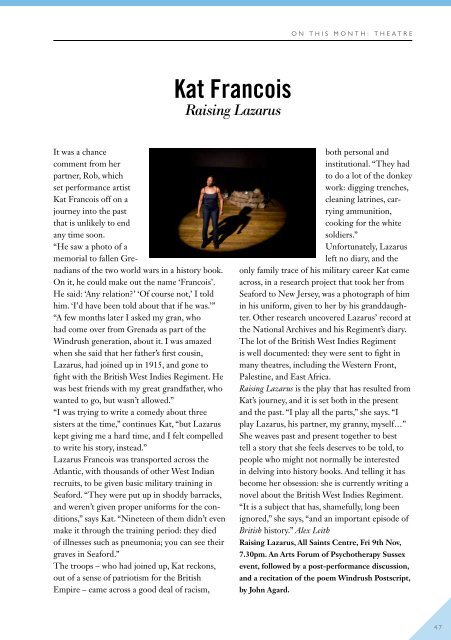Viva Lewes Issue #146 November 2018
You also want an ePaper? Increase the reach of your titles
YUMPU automatically turns print PDFs into web optimized ePapers that Google loves.
ON THIS MONTH: THEATRE<br />
Kat Francois<br />
Raising Lazarus<br />
It was a chance<br />
comment from her<br />
partner, Rob, which<br />
set performance artist<br />
Kat Francois off on a<br />
journey into the past<br />
that is unlikely to end<br />
any time soon.<br />
“He saw a photo of a<br />
memorial to fallen Grenadians<br />
of the two world wars in a history book.<br />
On it, he could make out the name ‘Francois’.<br />
He said: ‘Any relation?’ ‘Of course not,’ I told<br />
him. ‘I’d have been told about that if he was.’”<br />
“A few months later I asked my gran, who<br />
had come over from Grenada as part of the<br />
Windrush generation, about it. I was amazed<br />
when she said that her father’s first cousin,<br />
Lazarus, had joined up in 1915, and gone to<br />
fight with the British West Indies Regiment. He<br />
was best friends with my great grandfather, who<br />
wanted to go, but wasn’t allowed.”<br />
“I was trying to write a comedy about three<br />
sisters at the time,” continues Kat, “but Lazarus<br />
kept giving me a hard time, and I felt compelled<br />
to write his story, instead.”<br />
Lazarus Francois was transported across the<br />
Atlantic, with thousands of other West Indian<br />
recruits, to be given basic military training in<br />
Seaford. “They were put up in shoddy barracks,<br />
and weren’t given proper uniforms for the conditions,”<br />
says Kat. “Nineteen of them didn’t even<br />
make it through the training period: they died<br />
of illnesses such as pneumonia; you can see their<br />
graves in Seaford.”<br />
The troops – who had joined up, Kat reckons,<br />
out of a sense of patriotism for the British<br />
Empire – came across a good deal of racism,<br />
both personal and<br />
institutional. “They had<br />
to do a lot of the donkey<br />
work: digging trenches,<br />
cleaning latrines, carrying<br />
ammunition,<br />
cooking for the white<br />
soldiers.”<br />
Unfortunately, Lazarus<br />
left no diary, and the<br />
only family trace of his military career Kat came<br />
across, in a research project that took her from<br />
Seaford to New Jersey, was a photograph of him<br />
in his uniform, given to her by his granddaughter.<br />
Other research uncovered Lazarus’ record at<br />
the National Archives and his Regiment’s diary.<br />
The lot of the British West Indies Regiment<br />
is well documented: they were sent to fight in<br />
many theatres, including the Western Front,<br />
Palestine, and East Africa.<br />
Raising Lazarus is the play that has resulted from<br />
Kat’s journey, and it is set both in the present<br />
and the past. “I play all the parts,” she says. “I<br />
play Lazarus, his partner, my granny, myself…”<br />
She weaves past and present together to best<br />
tell a story that she feels deserves to be told, to<br />
people who might not normally be interested<br />
in delving into history books. And telling it has<br />
become her obsession: she is currently writing a<br />
novel about the British West Indies Regiment.<br />
“It is a subject that has, shamefully, long been<br />
ignored,” she says, “and an important episode of<br />
British history.” Alex Leith<br />
Raising Lazarus, All Saints Centre, Fri 9th Nov,<br />
7.30pm. An Arts Forum of Psychotherapy Sussex<br />
event, followed by a post-performance discussion,<br />
and a recitation of the poem Windrush Postscript,<br />
by John Agard.<br />
47


















